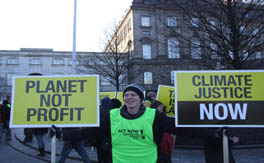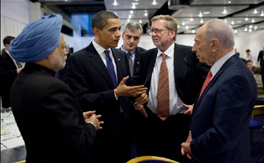Climate equity: women as agents of change
The “Climate Equity: Women as Agents of Change” Report has been jointly produced by the National Commission on Status of Women and UNDP Pakistan. The findings of the report have emerged from an extensive
The “Climate Equity: Women as Agents of Change” Report has been jointly produced by the National Commission on Status of Women and UNDP Pakistan. The findings of the report have emerged from an extensive
TAKING the lead in working out an equitable system for sharing the limited carbon space, India is planning to hold an international conference of experts in June. The goal of the conference will be to outline ways in which equity in burden sharing can be operationalised in a manner that doesn
Climate change is definitely the biggest story of the 21st century. But its sheer complexity and urgency is defeating us. For the past 19 years-the first intergovernmental negotiations took place in Washington DC, USA in early 1991-the world has been arguing about what it knows but doesn't accept.

Copenhagen Accord is weak, meaningless, fundamentally flawed and India should not endorse it, says CSE in this press release. It is a polluter's accord that will be disastrous for the fight against climate change and bad for India and the world.
This presentation shows the features of Copenhagen Accord: budget for 2020, cumulative injustice and how the burden of emission cut shifted to India, Inequity: Frozen and decided, how Copenhagen Accord is bad maths and worse politics.
An accusation that is being made post-Copenhagen is that the major developing countries, China in particular, blocked ambitious emission reduction targets that were offered by the advanced economies.
The First Assessment Report of the Intergovernmental Panel on Climate Change (IPCC) in 1990 noted that the greatest single impact of climate change might be on human migration. The report estimated that by 2050, 150 million people could be displaced by climate change-related phenomenon. More recent studies increase this estimate.

The "Copenhagen Accord" announced at COP 15 in Copenhagen. It agrees to weak and non-legally commitments from developed world and says that mitigation actions of developing nations will be open for "international consultation and analysis".
On a day when negotiations at Copenhagen were briefly stalled over the unwillingness of developed countries to discuss their previous commitments under Kyoto Protocol, China took the lead in stepping up pressure against the US and other Western powers with its Ambassador to India Zhang Yan calling for greater unity among developing countries amid what he termed as efforts to
A day after India, China and other G-77 countries decided against backdoor deals at the Copenhagen summit
This report provides background information that is relevant to assessing the ambition levels of the major countries involved in the current international climate negotiations. The EU